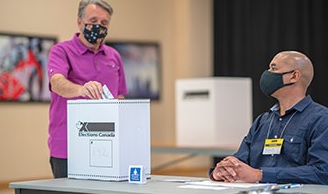Canada Federal Election September 2021
| You can now ask your questions about this election. Please go to the bottom of this page. |
|---|
Organisation : Elections Canada
Election Name : Federal Election 2021
Country : Canada
Election Date : Monday, September 20th 2021
Website : https://www.elections.ca/home.aspx
Canada Federal Election
Elections Canada is the independent, non-partisan agency responsible for conducting federal elections and referendums. Its mission is to ensure that Canadians can exercise their democratic rights to vote and be a candidate.
Related / Similar Post : 2021 Federal Election Student Vote Canada

Canada is a representative democracy divided into 338 ridings. When a federal election is called, Canadians vote to elect a member of Parliament to represent them in the House of Commons, where the member will debate and pass laws on behalf of their constituents. The candidate who receives the most votes in a riding is declared the winner. This is called a “first-past-the-post” system.
Each member of Parliament has a seat in the House of Commons. Candidates can represent a political party, or can be independent, meaning they have no association with a political party.
The Canada Elections Act states that a general election shall be held on the third Monday of October every four years. However, the Act does not prevent a general election from being held on another date. By law, election day must be at least 36 days and no more than 50 days after the day when an election is called.
Voting in a Federal Election
In a federal election, Canadians choose members of Parliament (MPs) to represent them in Ottawa.
To vote , you must:
** be a Canadian citizen
** be at least 18 years old on election day,
** prove your identity and address
Elections Step-By-Step
1. Dissolution:
The Governor General ends Parliament on the request of the Prime Minister and directs the Chief Electoral Officer to issue the writs of election. The writ is the official paperwork that launches an election in each riding.
2. Candidates:
Once an election is called, each party decides who its candidate will be in each riding. A candidate can also run for election without a party, as either an “independent” or with “no affiliation.”
3. Campaigning:
During the campaign period, candidates try to convince voters that they are the best choice to represent them in Parliament.
4. Voting:
The most common way to vote is at the polls on election day. Electors must prove their identity and address before getting a ballot. They then go behind a voting screen to privately mark their ballot. Election workers must follow strict procedures to ensure the secrecy of the vote.
How To Vote?
There are three ways you can vote
1. On election day:
If you have a voter information card, take it with you when you go to vote at the polling station at the address shown on the card.
If you don’t have a voter information card, and you didn’t register earlier, you can still register to vote at the polling station on election day by proving your identity and address, as described above. For your poll location, call Elections Canada at 1-800-463-6868 or click here.
2. At an advance poll:
If you don’t wish to vote on election day, you can vote earlier at an advance poll. The voter information card tells you the dates and address. If you do not receive a voter information card, you can find your poll here. Take it with you to the polling station. If you need to, you can also register at the advance poll.
3. Vote by special ballot:
Any eligible elector can apply to vote by special ballot. You can apply to vote by special ballot at any Elections Canada office, by mail, or through the Elections Canada Web site (www.elections.ca). Apply early, the last day to request a special ballot is 6:00 p.m. on the sixth day before election day.
Once you apply for a special ballot, you can only vote that way, and cannot vote at the advance polls or on election day. If you request a voting kit and do not receive it, contact Elections Canada.

Voting Hours on Election Day
Polls are open for 12 hours across the country on election day. The voting hours are staggered so that the majority of results are available at approximately the same time on election night. Voting hours at polling places for each time zone across Canada.
| Time zone | Voting hours (local time) |
|---|---|
| Newfoundland | 8:30 a.m. – 8:30 p.m. |
| Atlantic | 8:30 a.m. – 8:30 p.m. |
| Eastern | 9:30 a.m. – 9:30 p.m. |
| Central | 8:30 a.m. – 8:30 p.m. |
| Mountain (and Saskatchewan in the 2015 election)* |
7:30 a.m. – 7:30 p.m. |
| Pacific | 7:00 a.m. – 7:00 p.m. |